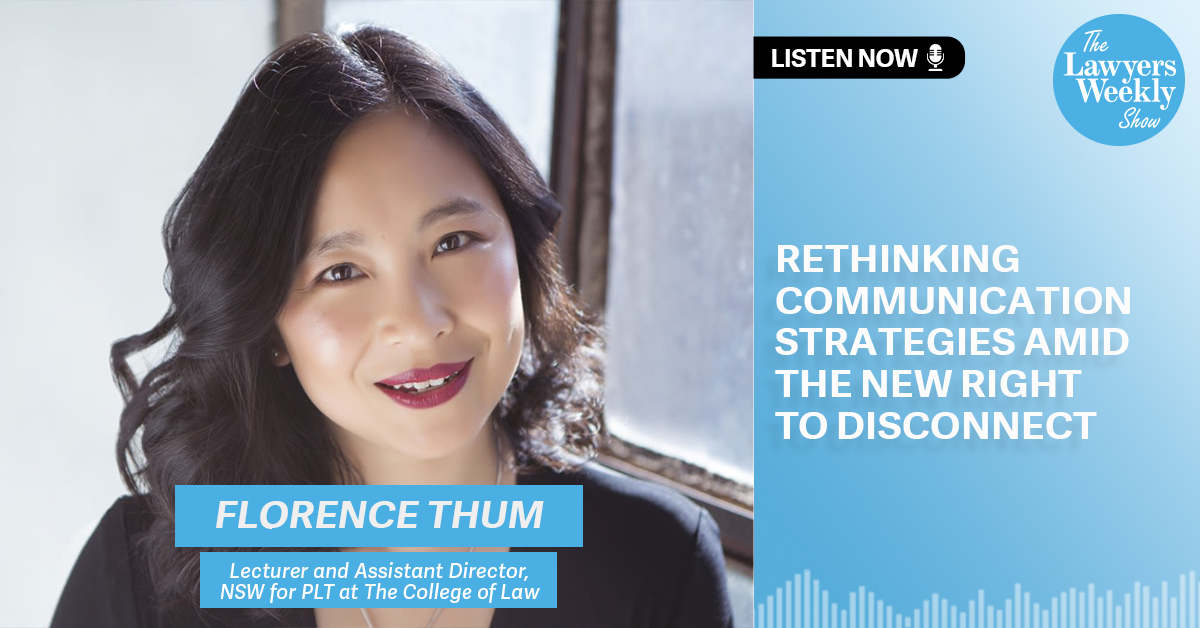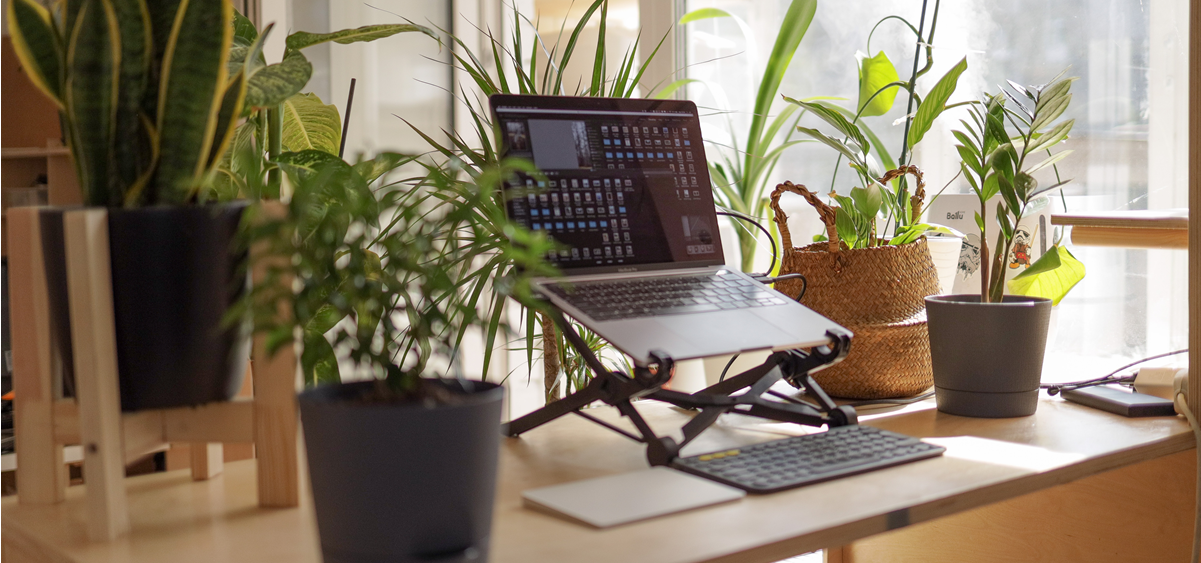Indicators of unhappy workplaces?
On invitation from Lawyers Weekly, I provided my comments on “[t]he new trends combating ‘unfulfilling’ and ‘detrimental’ workplaces‘.
Do not underestimate or dismiss these trends – such as, ‘snail girl era’, ‘bare minimum Mondays’ and their predecessor ‘quiet quitting’ – they give us valuable insights on the important issues and how to improve the modern workplace (and not limited to the legal profession).
I have posted about finding fulfilment in our work. And in turn, workplaces must evolve – it is a 2-way street.
“Workplaces must embrace its diverse people and the different ways in which they work; this means establishing inclusive practices and systems that promote psychological safety – in particular, trust and accountability – and are adaptable to the needs of its people”.
“Relationally, in the workplace, we have to care, to demonstrate compassion for others and ourselves, to move away from a scarcity mentality – where more for you means less for me – to an abundance mindset – there is enough for everyone, and to maintain a win-win approach with each other and our work.”
~ FlorenceT
An act of invitation
It has been a difficult year with all the changes and uncertainties, unforeseen when the term VUCA was first coined in the late 1980s. It was also a year we caught glimpses of the future and of its possibilities. And the models and frameworks of leadership and leading we knew may no longer apply, not in its entirety.
So as we enter the new year, how will you lead?
Leading is an act of invitation premised upon a conviction that collectively we arrive at a better outcome and a commitment to nurture this.
Giving space
Leading therefore involves giving space for people from diverse backgrounds with different views and methods to show up and to participate. It is not merely an expression of intention or a verbal invitation, rather it involves a series of actions to enable others to bring their best selves, their talents and capabilities into the process. These range from choosing to trust first on another’s good intentions to varying your meeting times to maximise attendance to establishing supportive policies.
Creating safe space
For you and for others to bring your best selves necessitate tapping into your authenticity, flaws and all, and this requires leaders to create a psychologically safe space, where not knowing, experimentation and even making mistakes are “allowed”.
Leading is taking the necessary actions to demonstrate the okay-ness of working together without the need to be right or all-knowing, or for the process or outcomes to be perfect; often stuck-ness comes from the struggle to be right. Collaboration is not synonymous to cooperation – and it is the former we must nurture.
Enabling capabilities
Leading is working to facilitate, support or equip others so they can participate at their optimum. Sometimes this requires the skill of asking hard questions, and to use the language in my coaching work, challenging the reluctance or resistance to showing up, in order to better understand and thus provide appropriate tools for their disposal. This may mean prompting a starting point, supplying a framework, creating an intellectual provocation, or naming a fear.
Inspiring vision and making a call
Leading involves clearing the fog and to inspire others to a vision and their commitment to see that vision become a reality.
Leading is also having the courage to make a call where required, to remove stuck-ness so progress can be made.
For your contemplation
So here are some questions to ponder:
- How can I take time to listen to a diverse range of people without preconceived notions of how or what ‘it’ should be?
- How can I ask questions which open up discussions and ideas, and not close down conversations?
- How do I hold up the vision and objectives as the beacon to light the way?
- How do I acknowledge the many paths that can be taken to reach those objectives?
- How can I take the necessary, but only the necessary, decisions in order to remove obstacles along the way?
How do I embody these in my personal and professional lives?
In our own ways – great or small – we can be leaders going into 2022!
Check-in – connection and belonging
I am noticing a lot of conversations around maintaining staff wellbeing, and supporting our teams and colleagues through these difficult times. Regardless of our location and the varied degree of “freedom”, all of us have been impacted by the pandemic.
Here’s something we can do, individually, to support our colleagues and friends.
Create a support circle.
It is informal and casual. It is establishing social connection – via chat, phone call or video call, or social media interaction.
I know the people in my circle will contact me if they need/want to. And I do the same with them – a difficult moment requires some “debrief” and a happy occasion is for sharing. That’s healthy.
Set your intention
Start by setting an intention. The support circle does not require us to be counsellors. Create a circle which you and others can belong and connect.
Shared experiences (say, of our workplace, of a particular professional group, or team) engender experiential and intellectual intimacies, and allow for conversations. The circle will be a vault where confidences are maintained. Bring our authentic self into the circle – show yourself and be prepared for candid conversations.
The “logistics”
Be specific and realistic about what we can do. This is after all about wellbeing, and self-care is a priority.
How much time will we dedicate to this, and how many per week? Individual or group interaction?
There is no fixed rule. This is a circle and the “arrangement” is loose. My check-ins are usually 1-to-1. It takes 10-15 mins and I find that’s enough for us. A matter for you how often you can engage with this. If you can manage one interaction a week, that’s good enough. At least one person will have received the generosity and kindness of your time and attention.
Who can I possibly contact? How big should the circle be?
Though not exhaustive, these questions can remind you of someone whom you can include in your support circle.
- Who lives alone?
- Who misses their family living interstate or overseas?
- Who has caring obligations exacerbated by social restrictions?
- Who is extroverted or sociable yet compelled to live under social restrictions?
- Who haven’t you heard from in a while?
- Who may be feeling additional stress directly because of the pandemic for eg. tech support staff who are working hard to enable our remote working life?
There is no “should” in this. We willingly come into the support circle. And if it is a circle of 2 persons, then so be it. Both of you will be better off with the experience.
No, thank you
Be sensitive to the possibility that our attention is not always welcomed or needed. Or someone may be receiving too much contact.
If you are being approached by too many people, then convey a grateful “no, thank you” to some of them. Setting personal boundaries is a resilience skill. Something along the lines of “thank you for checking in, I already have a support circle. Someone else will benefit from your check-in. Perhaps you may wish to check in on others who need support.”
If you are sensing a need for support within your community, and wondering what to do, I hope this is food for thought…and action.
You have the power to make a positive 😊 difference to someone’s day.
As we give, so we receive.
What’s more than a book group?
I love books, and reading. I love where books take me.
In my psychotherapy work, books and poetry become my tools.
Yet sometimes with the responsibilities of home, parenting and work, reading for leisure takes a back seat. In fact, it can feel like a luxury dabbled with a little guilt, as we take time away from the “shoulds” of our lives.
I know (as you do) that self-development or personal growth or “dealing with my stuff” is helpful not just for myself but also to those with whom I come in contact. I cannot give when empty.
I need to give myself permission to grow, to work on being my best self. Only then can I be in my best self with others.
No better time than now, as we are required to stay home and some of the “shoulds” have been taken from us. Maybe there’s a little time saved from our daily work commute. Or perhaps you’ve always wanted to but can’t justify the time. This may not even be at the top of your leisure list but being restricted from the outside world, this is a pleasurable option.
Come join me, (a psychotherapist trained in group facilitation and an avid book-reader) in an online book group which serves the purpose of leisure and personal development.
Stories can shape your lives. Here, you may come upon your tribe. You may gather some new insights. You may experience a certain liberation.
Ready to read books, have robust facilitated conversations, and share insights in a supportive space? There will be a selection of books which I will curate for the group to explore aspects of living life, which will inspire and motivate you to be better versions of yourself.
Interested to find out about More-than-a Book-Group?
Complete this Expression Of Interest (obligation-free) form, and I will be in contact to explore further.
~ FlorenceT
Be who you are and empowered
What an incredible weekend!
Spending time with my sisters in Law at the Aust. Women Lawyers Conference reminds me of why I chose to be a lawyer. The stories these amazing women told also sadly reminds me of why I left the practice of law. Though I am never far… for I am inspired to create change. These familiar stories are not intended to reinforce “victimhood” rather to make our, and women’s stories in general, visible. They are told in the spirit of recognition, solidarity and support.
They and the many actions women lawyers have taken to stake their claim to their rightful inheritance in the law, and to better the lives of women add to my inspiration and motivation. There was much discussion, and provocative and innovative ideas.
Some key messages (taken from my Tweets as I live-tweeted the event):
Lawyers need to engage their curiosity, be adaptable to change, collaborate, be inclusive, develop business acumen, have great communication skills and to not lose sight of the humanity in law.
These are essential human skills, salvaged from the trench of the “soft skills” label.
I will not be defined by the many labels you may put on me. I am complex.
And knowing who we are and what we stand for, are precursors to being fulfilled in our personal and professional lives, to being successful.
Inclusion and diversity require – in the words of Aretha Franklin, RESPECT.
Respect is a conscious act. What does it look like in practice? How do we do it?
Investing in the future (as was the theme of the Conference) begins with investing in the now, in ourselves.
Do we value ourselves enough to proclaim through our words and actions, “I am worthy”, “I am enough” and thus, “I belong”, feeling comfortable in the space we inhabit.
Sounding much like the work I do in Transfigure to empower professionals. Perhaps this is the reason why I am now more energised than before, to create change by facilitating others
- to engage with their human skills,
- to own their true selves and stand tall,
- to practice compassion and kindness on themselves and others, and
- most importantly, to take time for themselves for personal and professional development.
Fuelled by the passion of these incredible women, and to quote the AGS AWL Award recipient, the estimable Fiona McLeod SC, I will “get to it”.
~ FlorenceT
To be a great leader, you have to be…
S . E . L . F . L . E . S . S .
According to best-selling author of “Servant Leadership in Action” Raj Sisodia, great leaders possess
- Strength
- Enthusiasm
- Love
- Flexibility
- Long-term orientation
- Emotional intelligence
- Systems intelligence
- Spiritual intelligence
Check out this article in Inc.com for what each means.
How to connect
Building relationship is a “thing” now, a mantra within the networking, management and leadership circles. And rightly so. Seeking to build relationships honors our humanity, we are more than conduits engaging in mere exchange of insights and information, time and money and the cost-benefit analysis of these currencies.
We cannot build relationships unless we learn how to connect.
And the essence of real connection which we find so appealing, supportive, enriching and rewarding is intimacy. Intimacy is the glue that binds people. Without it, any connection is barren, void of the positive meaning.
But what is intimacy? It is a close, familiar and affectionate personal relationship with another and it arrives in different ways. We may have cognitive or intellectual intimacy with another with the sharing of ideas, visions, viewpoints, dreams and hopes. We may have experiential intimacy as we do work, however defined, together. We may also have emotional intimacy where feelings are shared between two or more people and our emotional needs are met or affirmed. And we have sexual intimacy which involves the sharing of sensual expression. This would include for example, the person whom we share our epicurean or creative interests.
There are many ways through which we develop intimacy in our professional life and connect.
And which comes first? Do we connect to enable intimacy to grow? Or is intimacy a prerequisite to connection? Instead of a linear cause-and-effect correlation, the relationship between intimacy and connection is reflexive.
Intimacy and connection are deliberate and conscious processes.
We must be willing to explore, to be interested in another’s life, to be present and available to them. Most importantly, we must be real. And we have to give it time to develop.
Hold new interactions lightly, watch it and see where it will grow. Let go of preconceived notions of how, what and why. Not every interaction becomes positive connection.
So how do we connect?
Be open and sociable. This does not mean be naive and gullible. It does however mean you do not approach every person you meet as a threat. Keep your head, open your heart.
Be authentic. Show who you really are. Stop being so guarded. It may feel vulnerable but my experience has been that most people are happy to receive the real you. Few people are out to harm.
Maintain your values. People with whom you connect will be those who share a certain ‘thing’ with you; this ‘thing’ which calls to you are underpinned by your values. Be yourself. Be honest.
In this endeavour of building relationships especially as a leader, let us be gentle, kind and respectful.
Which of us would refuse a genuine connection? On this premise, building relationship need not feel like an unsurpassable challenge.
~ FlorenceT
A mindful approach
Life is change. I know this. Even the reliable turns of the seasons do not go as expected, do they? If we are to see, there is beauty in the everyday minutiae of change.
And I believe in progress, less of the advancement of human enterprise, rather of the mindful approach to our human experience –
- towards greater awareness of who we are in the worlds we inhabit, whether personal or professional,
- towards greater connection to these worlds,
- towards greater understanding of our impact on them,
and to these, I have unwittingly been seduced since a young age, fuelled by an insatiable curiosity.
It is a beautiful seduction, though not necessarily easy or without pain.
This mindful approach requires an open mind and a vulnerable heart. And I am not without the scars to prove them.
The greater awareness to life also requires us to let go of the past and our ideas of the future, to have the willingness to be present without judgment and to see the world afresh. The wonder and intrigue that come our way when we allow ourselves to experience them.
Put aside the critical thoughts based on a past conditioning of what the future should be.
My daughter recently sang in a concert and for the first time, she did so in her school uniform. It was a school day after all. I remember when she eschewed the idea of changing from her school uniform, judgment flooded my mind questioning her dedication to her craft and fear that she wouldn’t be taken seriously. This lasted for a brief moment then I let those thoughts go. These are unwarranted worries and anxieties. My mind has always been an incredible trickster.
Her performance that evening was her best so far, for she captivated with her voice and composure, expressing her emotions from within. I looked around the room, and saw an audience rapt with attention, spellbound by her haunting rendition of “Burn” from the musical “Hamilton”. It seems she had developed a confidence grounded within herself; a fragile bubble at times for creative people. I am truly grateful that I did not prod at it with my unruly thoughts. To trust the process and let things unfold is not easy, but do-able.
Not all things change however… at least not at the speed or time that we expect them to. It is our expectation then which creates disappointment, hurt and pain.
Hope is present, expectation is merely a conditioned thought.
Expectations interfere with our connection to the world, for it is because of our fear for the myriad of unmet expectations – that our love will be betrayed, our vulnerability will be shamed, our curiosity mocked – that we distance ourselves from being alive in the moment to our work and relationships.
Identify a destination by all means, chart our course and trust that we have the capacity to undertake the journey. We do. Planning may be useful, but the fixation with each manoeuvre will inhibit our adaptability to change.
A mindful approach requires us to employ our senses in each moment, untainted by the past. Memories, “good or bad”, have their uses; we may not forget but we sure don’t need to be ruled by them.
Being mindful in a changing world requires trust, in ourselves and the unfolding life.
Each moment is a new moment.
~ FlorenceT
Impact of digitised delivery of legal services
“The features of digitized legal providers are becoming well- defined– they are customer centric, tech and process enabled, agile, diverse, accessible to clients in real-time, intelligent, globally branded, scalable, multi-disciplinary, and enterprise focused.”
What does the impact of technology on legal services mean for the humans in that space?
Customer-entric, agile, diverse, accessible, intelligent and enterprise-focused apply to lawyers (and other professionals). What skills are required to respond to a changing workplace?
They include the ability to grow and manage relationships, an ability to process and consolidate large amount of information, and the psychological agility to remain calm and focused in times of transition and change.
For article in Forbes magazine, see here.













